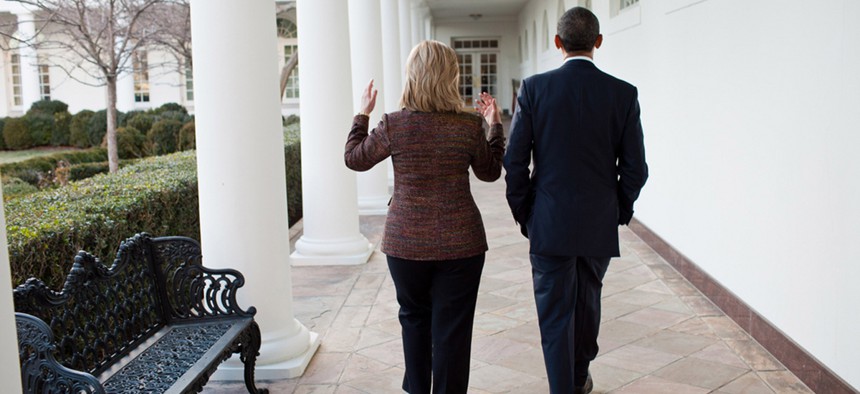
Pete Souza/White House file photo
Hillary Clinton Is Learning All the Wrong Lessons From Obama
She’s relying on the president’s advisers and old campaign strategy to win her the presidency. But what Clinton really needs is a fresh message and the fight of an underdog.
Hillary Clinton is clearly looking to emulate President Obama's historic 2008 campaign as she makes a second bid for the White House. Her kickoff campaign video features the very constituencies that Obama effortlessly energized in his first bid for office—working women, minorities, gay voters. She's hired several of Obama's top advisers to guide her bid, including pollster Joel Benenson and media strategist Jim Margolis. Even the name of her campaign organization, "Hillary for America," is a throwback to "Obama for America."
But as much as she'd like to recapture the Obama magic, the differences between her comeback effort and Obama's insurgent campaign are stark. What made Obama's first campaign so successful was that it was the equivalent of a start-up, an underdog that was forced to out-innovate its competition in order to pull off the upset. Clinton is looking more like an entrenched corporate behemoth that's grown complacent because it hasn't faced serious competition in years.
Indeed, the Democrats' bet on Hillary Clinton is a bet on a political brand over individual campaign talent, the belief that the party can build a super-infrastructure combining the best of Obama's and Clinton's advisers, and the assumption that $2.5 billion and countless connections can buy the nomination and position her as a frontrunner in the general election.
The notion that Clinton can simply hire the same talent, copy the same playbook, and expect similar results as Obama is fanciful. Successful start-up businesses grow, and often stop innovating as they lock up market share. (Obama's rocky second term, featuring many of the same campaign loyalists around him, is an example of this.) The techniques that once were cutting-edge get imitated by the competition, and become stale. Clinton is looking to emulate a president with underwater approval ratings and hired advisers who, for all their smarts, shepherded Obama through two disastrous midterm elections.
The better path would be the one not traveled, the one that breaks out of past practices. She's taking the path of the political machine, sublimating herself to the influence of the Obama team to win over his supporters. She barely even makes an appearance in her much-hyped campaign video. So far, Clinton's been surprisingly quiet discussing foreign policy, even though her experience as secretary of State was supposed to be her prime calling card. We're still waiting to hear what her campaign message will be.
Clinton is learning the wrong lessons from Obama's presidency. For all his political strengths, Obama has been a remarkably stage-managed president. He's avoided the mainstream news media like the plague, opting instead for friendly columnists, like-minded outlets such as Vox, or entertainment shows for interviews to get his message out. For much of his presidency, he's been operating in an echo chamber—one that's served his political interest of appealing to the progressive base.
Clinton doesn't have that luxury in running for president. She needs to show that she can connect with voters, and isn't cloistered in a bubble of entitlement. But she's trying to stage-manage her relatability—holding small events with voters without the media present—something that will become impossible to do under the klieg lights of a presidential campaign. Many candidates thrive under the voter scrutiny at town halls (think: John McCain) or the ability to connect with voters one-on-one (think: Bill Clinton). It doesn't make those interactions any less authentic just because there are cameras around. Hillary Clinton's insistence on closed press for certain events is borne less out of the need to have authentic interactions but from the reality that she's not particularly good at Politics 101.
Here's the Clinton paradox: The prospect of electing the first female president has always been a stronger selling point for Clinton's campaign than the reality of Hillary Clinton and her political skills. But to disabuse voters of the notion that she views the primary campaign as a formality, she'll need to showcase the weakest part of her repertoire. Meanwhile, she's relying on a similar message and approach as Obama even as clear majorities of voters are looking for a change.
Clinton got the preparation for a presidential campaign backwards: She prepared for her kickoff by assembling an all-star team of talent, rallying support for her candidacy among Democrats, while remaining largely invisible to voters save for a handful of paid, scheduled speeches. Her cross-country tour looks a bit too staged, even using the same "Scooby" van that she employed during her 2000 New York Senate campaign.
She should have started her listening tour before announcing her campaign and maybe, you know, done some actual listening before deciding to run. Stopping at a Chipotle restaurant in Ohio after announcing her campaign, an incognito Clinton went entirely unrecognized—and made no effort to talk to voters. And so far, her campaign has been cribbing from Obama's successful campaigns and co-opting lines from Sen. Elizabeth Warren—not sounding like an independent thinker with fresh ideas.
In polls, a clear majority of voters are saying they prefer change over the policies of the past. They're deeply dissatisfied with the direction of the country. And they're looking for new leaders to represent them. Clinton falls short on all those key counts. Her main advantages going forward are that she's a Democrat—at a time when more adults identify with Democrats than Republicans—and she can widen the gender gap running to be the first female president. If she wins, it won't be because of her political skill, but because of the Democratic machine.







